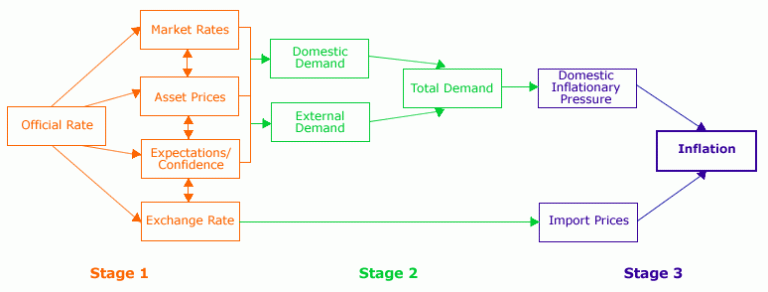
This post reflects the views of the author only, and not of any affiliated parties or groups. The author may have holdings in shares or funds mentioned in the post. Seek financial advice from a regulated professional before making investment decisions. When investing, your capital is at risk.
An issue hitting the headlines recently has been whether the Eurozone will fall into a deflationary spiral, similar to the one Japan experienced in its lost decade.
What is a deflationary spiral?
Firstly, deflation is defined as ‘a persistent fall in the general price level of goods and services’ (Economics, An A-Z guide). In non-economic terms it is when products become cheaper (not to be confused with Disinflation, which is when the rate of inflation falls).
A deflationary spiral is when a country experiences deflation, which encourages citizens to stop spending their money (in anticipation of further price falls) and therefore leads to a point where businesses reduce the production of goods and services. Businesses then start to make less money, leading to a reduction in wages and another fall in prices. The spiral keeps going on and businesses start to close causing unemployment to rises. In some cases the amount of money people are holding increases, but no one spends. This reached such a bad point in Japan that even when each citizen was given the equivalent of $200 to spend they were holding on to it, as deflation meant money was more valuable when held.
Deflation is bad! This is an important point to emphasise, as a lot of people think that falling prices can’t, surely, be a bad thing? However it has had such a devastating effect on the economy of Japan. This is because Monetary Policy stopped working in the deflationary spiral and Fiscal policies had to take the brunt of the attempt in perking up the economy; this has led to public debt in Japan reaching 200% of their GDP.
Central Banks identify it as a problem and often employ a ‘symmetrical’ inflation target, for example the Bank of England has an inflation target of 2% but sees 1% inflation just as bad as 3% inflation.
Recent European Events
The European Central Bank recently cut the official bank rate to 0.25% (down from 0.5%, previously discussed in this blog post). Inflation forecasting shows inflation well below the ECB’s target of 2%: 1.4% for 2013 and 1.1% for 2014 (source).
Cutting the official base rate helps to tackle low inflation/deflation as it increases the availability of money and encourages consumer spending and investment. The main economic theory behind this is the Transmission Mechanism (Fig.1)

For simplicity we shall just examine one channel. When the official rate is lowered it has the knock-on effect of decreasing Market Rates (step 1). These are the rates at which you borrow from the bank or receive credit when buying a car. By reducing these rates the cost of a loan decreases, making it more affordable to buy credit goods, such as cars. The increase in demand for cars will help to increase total demand (stage 2). As demand rises, so does output, and the general price level rises (demand begins to exceed supply) (Step 3).
Will it work?
Well, there are a number of issues to contend with. Firstly monetary policy has a time lag effect. The transmission mechanism above helps explain this, as it is clear that there are many stages for the rate change to work through, which takes time. Furthermore monetary policy works on a ‘blanket-like’ basis. I.e. when the base rate is cut it affects every country in the Eurozone, not just the ones actually experiencing deflation. Therefore the cut in rates could cause all kinds of turmoil to countries, for example Germany, who are in pretty good shape at the moment, as they could begin to ‘overheat’ and experience heavy inflation.
But is deflation really the problem?
Fiscal and Monetary Union
At the moment the Eurozone is a monetary union, they share the same currency and have little/no trade barriers. Citizens can travel and work freely across the member states and this helps make the Eurozone more competitive on a global basis. However the Eurozone lacks fiscal union. Every country is, well, still a country. This is contrasted to the system in the United States, where you have member states controlled by an over-riding Federal Government. Without fiscal union it makes it very difficult to support failing economies in the Eurozone, without resulting to the implementation of monetary policy (such as a reduction in rates) that will affect the countries which are better off.
Will Europe ever be a fiscal union? I believe that it will be an exceptionally difficult task to bestow to the Eurozone. There will be conflict between countries over who runs the Eurozone, i.e. small european countries such as Cyprus will see it as blatant favouritism if a one of the big two (France or Germany) end up running the government. Furthermore there will be conflicts of how to spend the money from taxes. Citizens in Germany will be frustrated to see their money being spent on shoring up other countries, such as Portugal and Greece who, arguably, got themselves into this mess.
Fiscal Union, For and Against Arguments: http://www.debatingeurope.eu/focus/infobox-arguments-for-and-against-fiscal-union/#.UqSy42RdUt0 (Debating Europe)
Will a reduction in the official base rate work? Can Europe avoid a deflationary spiral? Will Fiscal union be something of the future? Let me know your thoughts below, or tweet me @BreadEconomics.